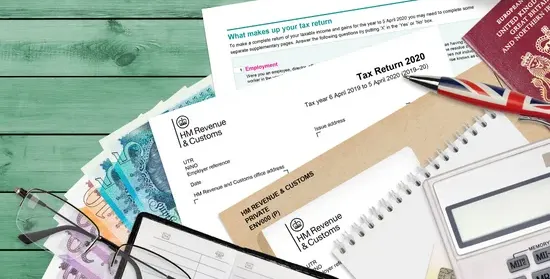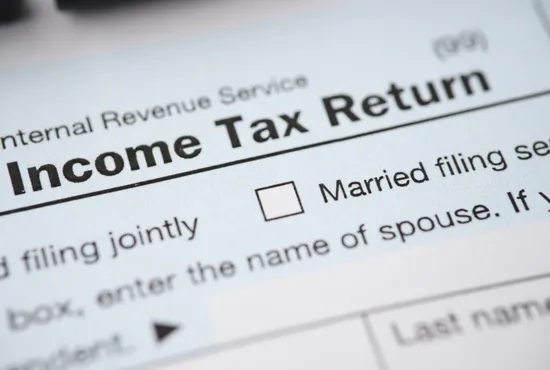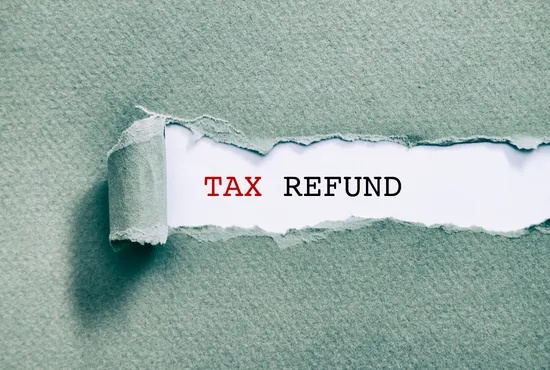
HMRC Tax Refund Scams
HMRC tax refund scams are a common problem in the UK. The scammers use various tactics to try and con people out of their money, including phishing emails, text messages, phone calls and even bogus websites.
In the 12-month period ending in August 2022, the tax authority received a mammoth 180,000 reports of fraudulent contact. Among these 81,000 were bogus offers of rebates and false warnings to victims that they would be arrested for tax evasion if they did not comply.
How does this scam work?
The scam works by way of deception – scammers rely on victims’ lack of knowledge about tax refunds and how HMRC actually operates in order to trick them into providing confidential information. The emails or messages sent by the scammers will often contain convincing official language, logos and contact details in an attempt to appear legitimate.
Fraudsters are contacting people via phone, email or text message claiming that they are entitled to a tax refund. To receive the money, victims are usually asked to provide personal details such as name, address, bank account information and passport/driver’s license numbers.
Once these have been provided by the victim, the scammer then provides them with false HMRC documents and ‘confirmations’ that state that a payment is on its way - when in reality no money will be received from HMRC. Unfortunately for some victims of this scam, payment is made but it soon transpires that their bank accounts have been hacked into and emptied.
HMRC tax refund scam - what are the most common tactics?

Phishing emails
The most common tactic used is phishing emails. In these types of scams, the scammers will send an email that appears to be from HMRC asking for personal information such as bank details or passwords. They may also claim that you are owed a tax refund and ask you to give them your banking details so they can deposit it into your account.
Email scams involving HMRC tax refunds are a particularly nefarious form of fraud. These types of scams involve fraudsters sending out emails that appear to be from the HMRC with subject lines such as “Tax Refund Confirmation” or “HMRC Tax Refund Notification.” The email typically includes a link for the recipient to click, which requests personal and financial information such as bank details. By providing this information, victims can become vulnerable to identity theft and financial losses due to fraudulent use of their personal data.
The scammers then use this information to access your accounts and steal your money. Some scammers will also contact people by telephone or text message to try and con them out of their bank details.
Fake phone calls
Phone scams involving HMRC tax refunds follow a similar pattern. Fraudsters may call victims claiming to be from HMRC offering them a tax refund, but will likely require personal information in order to process the payment. Victims should not provide any personal information regarding their taxes over the phone unless they have initiated contact with HMRC themselves and verified the caller is legitimate.
Fraudsters are taking advantage of unsuspecting customers by calling them, pretending to be from the tax office and using threats such as lawsuits, warrants for arrest or outstanding tax payments to extract money. These criminals may then encourage their victims to make a phone payment which goes directly into the scammer's bank account.
Fake text messages
Text message scams related to HMRC tax refunds also exist and should be approached with extreme caution. In many cases, these messages will include links pointing to malicious websites designed to harvest personal data or install malware onto victim’s devices. It is important that people do not click on any links in text messages from unknown sources as doing so could put them at risk of having their data stolen by cybercriminals.
To make things more difficult to spot, scammers can use number spoofing to make your phone display ‘HMRC’ as the sender, instead of their phone number.
Social media
Social media scams related to HMRC tax refunds are becoming increasingly common, especially on platforms like Twitter and Facebook where fake accounts impersonating government bodies can easily be set up without detection. It is important for users of such platforms to remain vigilant when it comes to posts relating to potential HMRC tax refunds - if something looks too good to be true, it usually is!
Fake companies
There are also a number of companies on the market that deal with 'helping' to recover tax as overpayment for work at home or abroad. There are many such companies that operate legally, but in the thick of it you may find that you are dealing with a fraudster who will extort money from you , and then disappear. Even if these companies are operating legally, you need to be aware that they are not connected to HMRC in any way.
HMRC will never send you an email asking to confirm personal details

HMRC is a public body that never contacts about tax refunds you by email or text message. HMRC only informs you about tax refunds through the post. If someone tries to contact you in this way you can be sure that their main aim is to trick you out of your personal details or steal money. If for some reason you are the one who has to pay the tax, HMRC will not ask you to do so by e-mail, nor will it send you a link to a quick payment.
How to spot tax refund scams?

Here are some tips for staying safe from HMRC scams:
1. Be suspicious of any emails or websites claiming to offer a tax rebate or refund from HMRC. Genuine emails from HMRC will only be sent if you have already made contact with them about a specific query or complaint.
2. Don’t click on any links in emails, even if they appear to be from HMRC. Scammers use these links to take you to fake websites where they can gather personal or financial details from you.
If HMRC needs to contact you by email for any reason pay attention to the details. Usually fake emails are addressed as 'dear customer' and are sent from a different address to @hmrc.gov.uk.
There have been email addresses on the web that have been reported as scams. They are: [email protected], [email protected], [email protected], [email protected], [email protected], [email protected], [email protected], [email protected], [email protected], [email protected], [email protected], [email protected], [email protected], [email protected], [email protected], [email protected], [email protected], [email protected].
3. Don’t open any attachments in emails, as these may contain malicious software which could steal your data or install a virus on your computer.
4. Never give out your bank account details over the phone, even if someone claims to be from HMRC and offers you a tax rebate or refund. Genuine HMRC staff will never ask for payment details over the phone or via email so don't be fooled!
5. If you're ever unsure about a message claiming to be from HMRC, contact them directly using their official website or telephone number to check if it is genuine before responding.
Where to report HMRC tax refund scams?

In conclusion, HMRC tax refund scams are an unfortunately common way for fraudsters to attempt to steal personal and financial information from unsuspecting victims. It is essential that individuals are aware of the various strategies used by scammers and take steps to protect themselves from falling victim to these types of scams. This includes not providing any personal information over the phone or email unless it has been verified as legitimate, not clicking on links in text messages from unfamiliar sources and remaining cautious when responding to posts related to potential tax refunds on social media.
Taking these precautions can help people avoid becoming victims of identity theft and other financial losses due to fraudulent use of their data. Watch out for scam emails, bogus emails and voicemail messages with a tax query, and report them immediatley.
What to do if you became a victim of tax refund scam?
If you believe you have been the victim of an HMRC tax refund scam, it is important to report it as soon as possible. You can do this online by going to the Action Fraud website or by calling 0300 123 2040. It is also a good idea to contact your bank immediately if you suspect that any money has been taken from your account.
By reporting the fraud promptly, you will help to protect yourself and other members of the public from becoming victims in future scams. Taking action now could save you a lot of hassle and inconvenience in the long run.